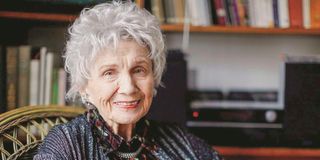The Alice Munro I never knew: Reflecting on the clash between public persona and private failures

Author Alice Munro, widely lauded as the master of the short story, photographed in December 2013.
What you need to know:
- I've been grappling with the contested legacy of Alice Munro, whose work deeply impacted me, in light of recent allegations of her complicity in her daughter's sexual abuse.
- This revelation has forced me to reevaluate my admiration for Munro and confront the dissonance between her public image and private actions.
I spent a lot of time this weekend reflecting on the now contested legacy of Alice Munro, the 2013 Nobel Laureate in Literature. The life of the Canadian literary superstar and short story writer was paved by many other achievements including the Man Booker International Prize, which she scooped in 2009.
I was introduced to Alice Munro by an Irish man I met when I was 20 at a workshop organised by his company. He took a keen interest in my career after I talked extensively about the book I was reading during one of the breaks. While he commended my reading habits, he was concerned that my scope wasn't expansive enough, potentially limiting my worldview.
At a subsequent workshop he invited me to, he brought me two short story collections by non-African authors: Field Study by Rachel Seiffert and Lying Under the Apple Tree by Alice Munro.
I remember poring over the short story collection Lying Under the Apple Tree and being immediately struck by the pithy use of language and the way events in the book spurred a desire for action. The stories had a convicting nature that left a lasting impression on me.
Alice Munro, who passed away in May at the age of 92, was celebrated globally for her profound impact on literature. However, her daughter, Andrea Skinner, recently published a poignant essay in the Toronto Star accusing Munro of complicity in sexual abuse. According to Skinner, she was abused by her stepfather at the age of nine, and despite Skinner disclosing this to Munro (supported by court documents confirming the abuse), Munro chose to remain with her husband and took no action to address her daughter's suffering.
Many sworn lovers of Alice Munro are conflicted because of the clash between these damning revelations and the meaning they had come to attach to what they believed Alice Munro stood for through what they perceived from her writing.
On social media, some readers have shared images trashing all Munro books from their shelves; headlines such as ‘Alice Munro was hiding in plain sight’ littered sites in Europe and the United States. Many fans are shattered.
I am one of the fans who has to deal with the shockwaves that followed this revelation. I had a conversation with a colleague about this. He was very empathetic and one of the things he left me reflecting on was the often difficult choices that people are regularly faced with in life. It brought me back to the question of personal values, and how they flow into what we live for and the causes we support. What if we can’t truly live out our values? What happens when you publicly support women empowerment while privately disempowering women in your household?

Some of Alice Munro's books.
About three months ago, my therapist gave me the assignment to come up with a list of 15 personal values. The goal was to help me improve my guardrails around relationships and friendships, to ensure my boundary lines are clearer. The bigger goal was to ensure I live consciously and presently; and I do not have a ‘double-life’.
There are things I know instinctively that I strongly believe in and easily make the list of my values such as faith and honesty. But 15? Of course I did what you are imagining – went to Google and typed: “examples of personal values”. At the next session, the therapist said something that made me extremely present in the way that I live my life.
“Something you call a personal value should be what anyone who has interacted with you can attest to. If you say one of your values is faith, it means everyone who has had a sufficient interaction with you can attest to that. Otherwise that may not be a true value.”
The complication around the legacy of Alice Munro is an invitation for us, to among other things, think about whether there is alignment between our private lives and our public lives. It is true that every human being is flawed. In fact, when I interact with someone who gives me the impression that they do not have any flaws, I get worried. So alignment between private and public lives by no means suggests that we need to be perfect human beings making no mistakes. It just means being faithful to yourself, and courageous enough to step up when you make mistakes and take steps towards correction.
For Andrea Skinner, I pray for peace as she negotiates this season. As for the broader legacy of Alice Munro, may we all learn from her, and may we do better by learning from her and committing not to be complicit in sexual abuse.
The writer is the Research & Impact Editor, NMG





